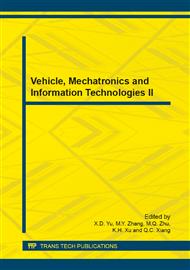p.1967
p.1972
p.1977
p.1981
p.1987
p.1995
p.2000
p.2004
p.2009
Research on Multi-Optimizing Strategy for MVB Sporadic Data of Rail Transit On-Board Network
Abstract:
In order to improve real-time of MVB sporadic data communication, we study and analysis MVB sporadic data communication scheduling modelling and collision event arbitration mechanism, the communication maximum arbitration delay is closely related with concurrent message events, binary tree search algorithm mechanism bring out big communication delay, so, we makes use of multi-optimizing strategies, applying dynamically assigned communication of sporadic data and slave frame stuffing of process data, decreasing communication delay of sporadic data and making sure that emergent sporadic data firstly send, it is a good try to optimize real-time of sporadic data.
Info:
Periodical:
Pages:
1987-1994
Citation:
Online since:
March 2014
Authors:
Price:
Сopyright:
© 2014 Trans Tech Publications Ltd. All Rights Reserved
Share:
Citation:


